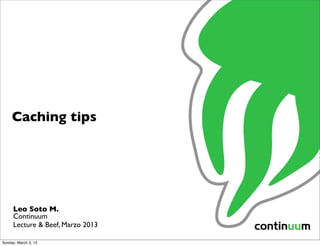Caching tips
- 1. Caching tips Leo Soto M. Continuum Lecture & Beef, Marzo 2013 Sunday, March 3, 13
- 2. Caching tips (for webapps) Leo Soto M. Continuum Lecture & Beef, Marzoss 2013 Sunday, March 3, 13
- 3. âThere are only two hard things in computer science... Sunday, March 3, 13
- 4. ...cache invalidation and naming thingsâ - Phil Karlton Sunday, March 3, 13
- 5. HTTP Caching âĒClient-side! âĒ...or âmiddle-sideâ (proxys!) âĒConceptos claves: âĒFrescura (freshness) âĒValidacion/Invalidacion Sunday, March 3, 13
- 6. FRESH CACHES âĒHTTP/1.0: Expires:  Fri,  01  March  2013  20:00:00  GMT âĒHTTP/1.1: Cache-ÂâControl:  *pila-Ââde-Ââopciones* Cache-ÂâControl:  private,  max-Ââage=3600 Sunday, March 3, 13
- 7. VALIDATED CACHES âĒHTTP/1.0: Last-ÂâModified  /  If-ÂâModified-ÂâSince 304  Not  Modified âĒHTTP/1.1: ETag  /  If-ÂâNone-ÂâMatch 304  Not  Modified Sunday, March 3, 13
- 8. CACHE INVALIDATION âĒMETODOS HTTP QUE INVALIDAN CACHES FRESCAS: POST Â /resource DELETE Â /resource PUT Â /resource Sunday, March 3, 13
- 9. EN RAILS âĒFRESH CACHES: expires_in  1.hour âĒVALIDATED CACHES if  stale?(etag:  @modelo)   otros_hits_a_la_bd end Sunday, March 3, 13
- 10. stale?(etag: Â x) Â -Ââ> Â Etag: Â md5(expand_cache_key(x)) # File activesupport/lib/active_support/cache.rb, line 77 def expand_cache_key(key, namespace = nil) expanded_cache_key = namespace ? "#{namespace}/" : "" if prefix = ENV["RAILS_CACHE_ID"] || ENV["RAILS_APP_VERSION"] expanded_cache_key << "#{prefix}/" end expanded_cache_key << retrieve_cache_key(key) expanded_cache_key end # File activesupport/lib/active_support/cache.rb, line 90 def retrieve_cache_key(key) case when key.respond_to?(:cache_key) then key.cache_key when key.is_a?(Array) then key.map { |element| retrieve_cache_key(element) }.to_param else end.to_s end Sunday, March 3, 13
- 11. # File activerecord/lib/active_record/integration.rb, line 37 def cache_key case when new_record? "#{self.class.model_name.cache_key}/new" when timestamp = self[:updated_at] timestamp = timestamp.utc.to_s(:number) "#{self.class.model_name.cache_key}/#{id}-#{timestamp}" else "#{self.class.model_name.cache_key}/#{id}" end end Sunday, March 3, 13
- 12. EN RAILS âĒSIN ETAGGER stale?(etag: Â [current_user, Â @modelo]) stale?(etag: Â [current_user, Â @otro]) stale?(etag: Â [current_user, Â @otromas]) Sunday, March 3, 13
- 13. EN RAILS âĒCON ETAGGER etag  {  current_user  } stale?(etag:  modelo) stale?(etag:  otro) stale?(etag:  otromas) Sunday, March 3, 13
- 14. EN RAILS âĒEN AC PERFORACIONES etag  {  [current_user,  ENV[âCOMMIT_HASHâ]  } stale?(etag:  modelo) stale?(etag:  otro) stale?(etag:  otromas) Sunday, March 3, 13
- 15. Rails Fragment Caching -Ââcache  âfooâ  do...end -Ââcache  modelo  do...end -Ââcache  [reporte,  âinboxâ]  do..end # File actionpack/lib/action_controller/caching/fragments.rb, line 51 def fragment_cache_key(key) ActiveSupport::Cache.expand_cache_key( key.is_a?(Hash) ? url_for(key).split("://").last : key, :views) end Sunday, March 3, 13
- 16. RUSSIAN DOLL CACHING -Ââ  cache  [reporte,  âperforacionesâ]  do   -Ââ  perforacion.each  do  |p|     -Ââ  cache  perforacion  do       %h1=  perforacion.titulo       %p=  perforacion.whatever Sunday, March 3, 13
- 17. TIPS FRAGMENT CACHING âĒAplicar a cosas que no dependan del usuario actual âĒUsar cache_digests + memcached Sunday, March 3, 13
- 18. CONCLUSIONES âĒHTTP CACHING: âĒCACHE LOCAL AL USUARIO âĒAHORRA: âĒLATENCIA âĒANCHO DE BANDA, âĒTIEMPO DE RESPUESTA DEL SERVIDOR Sunday, March 3, 13
- 19. CONCLUSIONES âĒFRAGMENT CACHING: âĒCACHE GLOBAL DE LA APP âĒAHORRA: âĒHITS A LA BD âĒCALCULOS âĒRENDERING Sunday, March 3, 13
- 20. BONUS TRACK def prefetch(url) content_tag("script", %Q{ $("<link href='#{escape_javascript(url)}' rel='subresource'/>").appendTo('head') }.html_safe ) unless current_page?(url) end def tab_detalle_reporte(text, opts = {}) collection = opts[:collection] || text.downcase.pluralize url = send("reporte_#{collection}_path", estado, reporte) tab_title(opts.merge!( name: text, href: url, active: tab == collection )) + prefetch(url) end Sunday, March 3, 13









![stale?(etag:
 x)
 -Ââ>
 Etag:
 md5(expand_cache_key(x))
# File activesupport/lib/active_support/cache.rb, line 77
def expand_cache_key(key, namespace = nil)
expanded_cache_key = namespace ? "#{namespace}/" : ""
if prefix = ENV["RAILS_CACHE_ID"] || ENV["RAILS_APP_VERSION"]
expanded_cache_key << "#{prefix}/"
end
expanded_cache_key << retrieve_cache_key(key)
expanded_cache_key
end
# File activesupport/lib/active_support/cache.rb, line 90
def retrieve_cache_key(key)
case
when key.respond_to?(:cache_key) then key.cache_key
when key.is_a?(Array) then key.map { |element|
retrieve_cache_key(element)
}.to_param
else
end.to_s
end
Sunday, March 3, 13](https://image.slidesharecdn.com/cachingtips-130303181653-phpapp02/85/Caching-tips-10-320.jpg)
![# File activerecord/lib/active_record/integration.rb, line 37
def cache_key
case
when new_record?
"#{self.class.model_name.cache_key}/new"
when timestamp = self[:updated_at]
timestamp = timestamp.utc.to_s(:number)
"#{self.class.model_name.cache_key}/#{id}-#{timestamp}"
else
"#{self.class.model_name.cache_key}/#{id}"
end
end
Sunday, March 3, 13](https://image.slidesharecdn.com/cachingtips-130303181653-phpapp02/85/Caching-tips-11-320.jpg)
![EN RAILS
âĒSIN ETAGGER
stale?(etag:
 [current_user,
 @modelo])
stale?(etag:
 [current_user,
 @otro])
stale?(etag:
 [current_user,
 @otromas])
Sunday, March 3, 13](https://image.slidesharecdn.com/cachingtips-130303181653-phpapp02/85/Caching-tips-12-320.jpg)

![EN RAILS
âĒEN AC PERFORACIONES
etag
 {
 [current_user,
 ENV[âCOMMIT_HASHâ]
 }
stale?(etag:
 modelo)
stale?(etag:
 otro)
stale?(etag:
 otromas)
Sunday, March 3, 13](https://image.slidesharecdn.com/cachingtips-130303181653-phpapp02/85/Caching-tips-14-320.jpg)
![Rails Fragment
Caching
-Ââcache
 âfooâ
 do...end
-Ââcache
 modelo
 do...end
-Ââcache
 [reporte,
 âinboxâ]
 do..end
# File actionpack/lib/action_controller/caching/fragments.rb, line 51
def fragment_cache_key(key)
ActiveSupport::Cache.expand_cache_key(
key.is_a?(Hash) ?
url_for(key).split("://").last :
key,
:views)
end
Sunday, March 3, 13](https://image.slidesharecdn.com/cachingtips-130303181653-phpapp02/85/Caching-tips-15-320.jpg)
![RUSSIAN DOLL
CACHING
-Ââ
 cache
 [reporte,
 âperforacionesâ]
 do
Â
 -Ââ
 perforacion.each
 do
 |p|
Â
Â
Â
 -Ââ
 cache
 perforacion
 do
Â
Â
Â
Â
Â
 %h1=
 perforacion.titulo
Â
Â
Â
Â
Â
 %p=
 perforacion.whatever
Sunday, March 3, 13](https://image.slidesharecdn.com/cachingtips-130303181653-phpapp02/85/Caching-tips-16-320.jpg)



![BONUS TRACK
def prefetch(url)
content_tag("script",
%Q{
$("<link href='#{escape_javascript(url)}'
rel='subresource'/>").appendTo('head')
}.html_safe
) unless current_page?(url)
end
def tab_detalle_reporte(text, opts = {})
collection = opts[:collection] || text.downcase.pluralize
url = send("reporte_#{collection}_path", estado, reporte)
tab_title(opts.merge!(
name: text,
href: url,
active: tab == collection
)) + prefetch(url)
end
Sunday, March 3, 13](https://image.slidesharecdn.com/cachingtips-130303181653-phpapp02/85/Caching-tips-20-320.jpg)